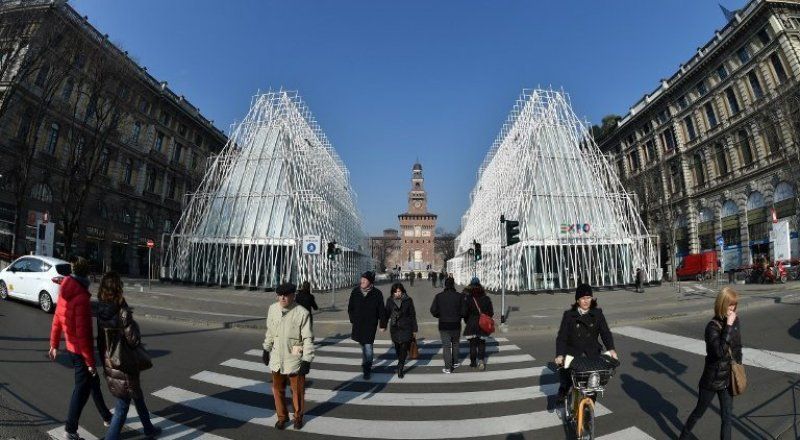 Italy is having a party, the whole world is invited and, yes, there will be food; lots of it, AFP reports.
Italy is having a party, the whole world is invited and, yes, there will be food; lots of it, AFP reports.
Expo Milan 2015, the first world fair since Shanghai's groundbreaking event five years ago, opens its doors on Friday amid optimism that the six-month nutrition and gastronomy-themed fest will help lift the host country out of the economic doldrums.
"We can say with great satisfaction that the Expo gamble has paid off," Prime Minister Matteo Renzi said Monday, underlining the high hopes invested in an event expected to draw more than 20 million people to Italy's economic capital.
With more than 50 countries hosting exhibitions in purpose-built national pavilions and a total of more than 140 involved in some way, Italy is counting on long-term benefits in terms of revamping the country's brand image and attracting inward investment.
It is also looking to the short-term fillip that will come from increased tourist spending during the exhibition.
Finance Minister Pier Carlo Padoan said the Expo could deliver the confidence boost needed to kickstart the economy.
"It represents a symbol of recovery and confidence that could translate into investment," Padoan told foreign correspondents in Rome.
Expo supremo Giuseppe Sala, who has had to battle construction delays and a series of embarrassing corruption scandals in the run-up to Friday's opening ceremony, has estimated the net benefit to the country from hosting the fair at 10 billion euros ($11 billion).
Half would come in the form of additional tourist spending and the balance from boosts to investment.
"It is an incredible opportunity for Italy to be the centre of the world for six months, especially with relation to food and all the themes related to food," said Eugenio Magnani, the head of Italy's national tourist board ENIT.
Bamboo panels
With the official theme of "Feeding the Planet, Energy for Life," Expo 2015 will be as much about showcasing innovation in food production for a growing global population as about showing off techniques in the kitchen.
The privately financed United States pavilion, for example, is dedicated to the theme of how the world will feed itself in 2050, when the global population is projected to have reached nine billion.
"Quite frankly we don't even have the energy on this planet to feed nine billion people, let alone the food," said Dorothy Cann Hamilton, the president of the Friends of the US Pavilion.
To offset the serious stuff, Cann Hamilton is also promising to showcase the latest culinary trends from the other side of the Atlantic.
"We are going to shock the world with how good American food is," she promised.
The most striking of several architecturally innovative pavilions is China's, its first official representation at an overseas Expo.
Designed by New York-based Chinese architect Yichen Lu, the pavilion, which will host an exhibition called "Land of Hope", features a dramatically undulating roof made from bamboo panels and is intended to reference China's modern and traditional landscapes.
It is also intended to symbolise harmony between the city and nature -- appropriately enough since the Expo site was constructed, at a cost of 2.5 billion euros, on former agricultural land.
Protests planned
With around 10 million tickets already sold, Milan's second hosting of a world fair (the first was in 1906) is off to a strong start, perhaps remarkably for a format that began with the 1851 Great Exhibition at London's Crystal Palace.
"One of the interesting aspects of this exhibition is the choice of a theme that does not work well on the net," said Davide Chiaroni of Milan's Politecnico university.
"To taste, experience the emotion of food, you have to be physically there. It is not yet possible to do it virtually," he said.
The corruption problems forced the government to put the Expo under the control of an authority headed by an anti-mafia judge.
They have had knock-on effects in terms of construction delays, particularly on the Italian pavilion, where workers have been labouring round the clock since March in a bid to ensure it is finished on time.
"We are now on the finishing touches, the snagging," Sala assured AFP. "There may be one or two pavilions not completely ready but the race is on - nobody wants to be the one who doesn't open."
Getting the giant site ready will have been no mean feat, with up to 250,000 visitors expected on the busiest days and 150 restaurants preparing to serve up 27 million dishes over the six months.
Fears the event could be targeted by terrorists mean security will be tight, with visitors protected by airport-style security with a perimeter fence, scanners at entry points and some 2,000 cameras.
Anti-globalisation protestors have denounced the involvement of global corporations like McDonalds, Coca Cola and Nestle and the decision to hold the opening on May 1, forcing staff to work on what is traditionally a holiday to mark international labour day. The No Expo movement is planning four days of protest around the opening.
Source: tengrinews
 В Атырау -10
В Атырау -10